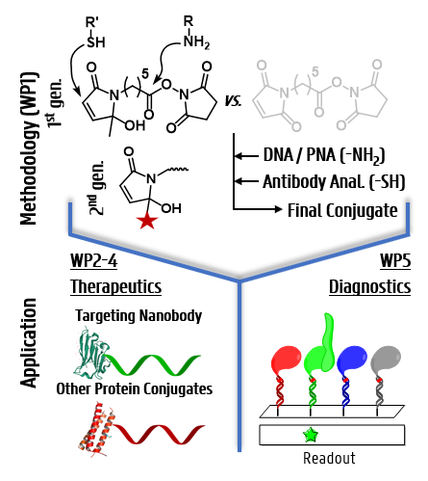Jan H. Meffert
CV
Jan H. Meffert completed his undergraduate education in Chemistry at Bielefeld University, Germany and at University of Paris, France, in a double degree programme where he obtained two first-class BSc degrees. During his bachelor’s thesis at the university Paris‑Saclay in the group of Prof. Guianvarc'h, he developed and validated a synthetic approach towards a “lipid A” analogue via one-pot tandem catalysis.
During his first master’s at Bielefeld University, he then mainly focused on developing catalytic methodology towards pharmaceutically relevant chiral fragments. After three research projects at different institutions in industry and academia, he joined Prof. Gröger’s group, which allowed him to combine his gained knowledge in catalysis. In his master’s thesis, he investigated the combination of organo- and biocatalysis for the synthesis of chiral 1,3-diamines, leading to a first-class MSc degree.
Following that, a scholarship awarded by the German Academic Exchange Service allowed him to expand his knowledge into chemical biology by joining Dr. Di Antonio’s Group at Imperial College London, UK in the context of a MRes degree in Drug Discovery and Development. He developed and synthesised a CRISPR Cas9 drug conjugate and evaluated its ability to perform site-selective DNA alkylation.
Thrilled by the possibilities of highly selective therapeutics, he joined the Marie-Curie Innovative Training Network “OLIGOMED” in October 2021. Within this network he obtained his PhD under the supervision of Prof. Madder.
Contact:
Research Project
Antibody (Analogue) - Oligonucleotide Conjugation
We herein propose to exploit the 5HP2O conjugation methodology (see general research interests) to synthesise novel therapeutically relevant antibody analogue-oligonucleotide conjugates. In a comparison between conjugation strategies, we first plan to evaluate the 5HP2O methodology’s potential against aspects like stability (WP1). To add to that, novel trifunctional linkers (bearing e.g. fluorophores) will be synthesised to show the 5HP2Os versatility. Based on these insights we plan to develop novel conjugates exploiting antibody analogues (nanobodies and alphabodies) to improve the delivery of oligonucleotides and their pharmacokinetic properties. These aspects currently represent the biggest hurdle towards successful oligonucleotide therapeutics. Compared to monoclonal antibodies, which are commonly used to deliver small molecule drugs, the usage of the smaller antibody analogues promises several advantages (e.g. better tissue penetration, possibility of subcutaneous administration, higher stability and an easy bioconjugation). A therapeutic nanobody-oligonucleotide conjugate against a specific therapeutic target (WP2) and other protein-oligonucleotide conjugates (WP3) will be synthesised and characterised. The novel constructs will be evaluated in-vitro and in-cellulo in terms of their cellular internalisation and therapeutic effect (antisense effect) (WP4). In another project, PNA-Nanobody conjugates will be synthesised and evaluated for antigen detection in a microarray setup (WP5).
